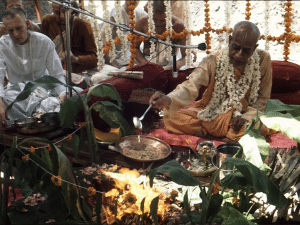What does the secretary do?
Dayananda: Tamal Krishna was in charge of a traveling sankirtan party, and he was a much more effective leader and manager than I was. I was the temple president of what had been a small Los Angeles temple but, with Tamal's presence, it became a much larger entity, with many more brahmacharis and brahmacharinis. Besides being temple president, I was also working all day. So Tamal Krishna went to Prabhupada for clarification. He asked, "What's my position, and what's the position of Dayananda, the temple president?" Prabhupada answered, "Dayananda remains the temple president." Then Prabhupada suggested we have elections, and he personally nominated some people for different posts. He nominated me for temple president, Tamal Krishna for secretary, Jayananda for vice president, and Silavati for head pujari, I don't know if head pujari was an elected position. Prabhupada also nominated Virabhadra for temple commander. The devotees voted for everyone Prabhupada nominated, except that we didn't want Virabhadra as the temple commander because he was only twelve years old. So we nominated and elected Vishnujana as the temple commander instead. Madhudvisa was the treasurer, nominated by Prabhupada and elected by us. When Tamal became the secretary, there was a question, "What does the secretary do?" Prabhupada said, "The secretary is the person who deals directly with the spiritual master." It was a predefinition of the GBC secretary.
Later on I realized that Prabhupada was incredibly skilled in the way he managed the whole situation. The temple was in a major transition, and yet I remained the president. I've thought about it a lot since then, and I've seen that sometimes a temple president is not very effective, and another guy comes in who's much more effective. One idea is, "Let's get rid of this old one and put in the new one." But the way Prabhupada did it was so skillful, he created a new position and kept the temple president so that there was consistency in the management.
Reference: Memories Anecdotes of a Modern Day Saint - Volume 1 by Siddhanta Dasa
Recently Added
Trending Today
